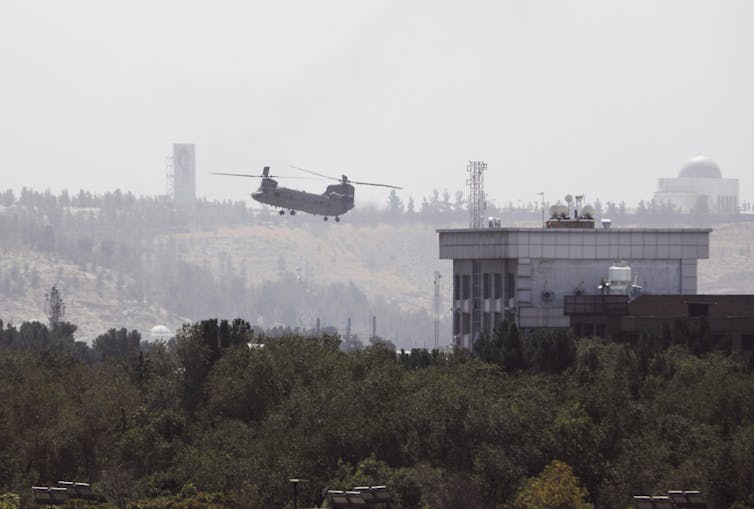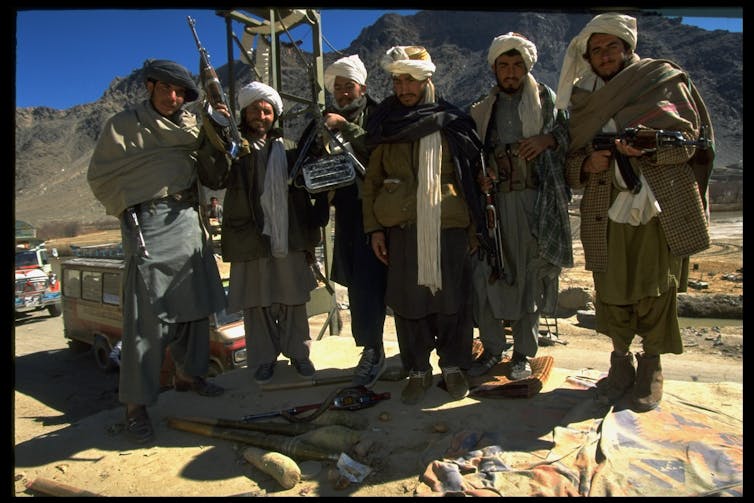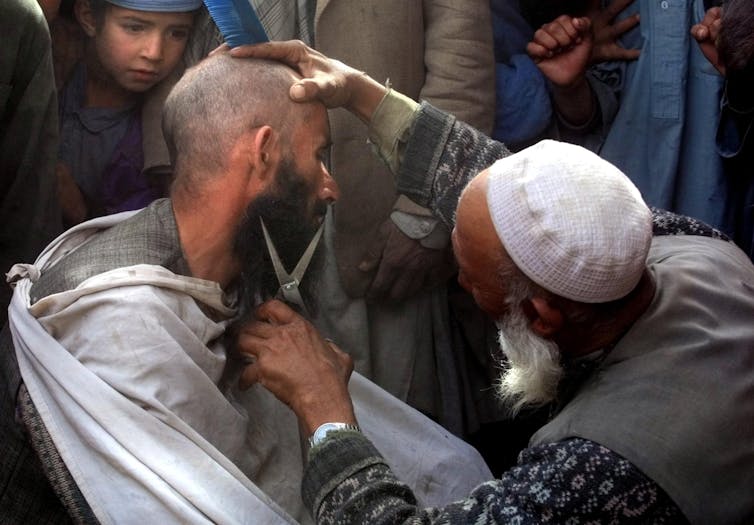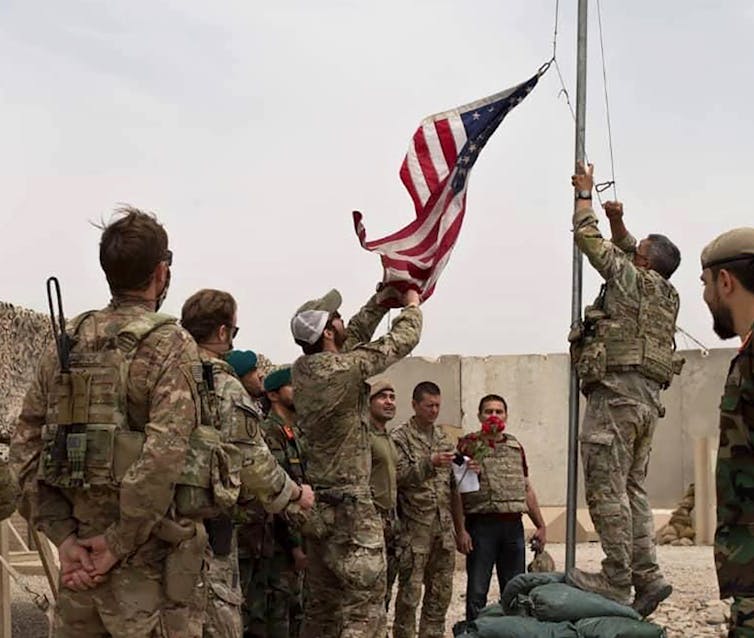
AP Photo/Rahmat Gul
Catesby Holmes, The Conversation
Under siege, President Ashraf Ghani of Afghanistan has departed the country as Taliban insurgents, who had seized most major Afghan cities in recent weeks, moved into their final target, the Afghan capital, Kabul, on Aug. 15, 2021.
United States personnel were evacuated from Afghanistan and, according to the Associated Press, panicked citizens aiming to escape were “lining up at cash machines to withdraw their life savings” on Sunday. Afghans now face a life not under democratic rule but under the rule of radical Islamic fighters.
The apparent fall of Afghanistan came just three months after the U.S. began to withdraw its troops from the country after a 20-year war that killed 2,448 U.S. service members, 3,846 U.S. military contractors and 66,000 Afghan national military and police.
For Afghans and international observers of a certain age, it looks like history is repeating itself.
The Taliban – which means “the students” in Pashto – seized control of Afghanistan in 1996 after capturing Kabul from various rival groups in the Afghan civil war. They established a government based on their extreme interpretation of Islamic Sharia law and ruled for five years. The Taliban regime was then toppled in 2001 by the U.S.-led invasion of Afghanistan.

Robert Nickelsberg/Getty Images
Afghanistan experts have offered insight into the Taliban – then and now – and the United States’ role in Afghanistan’s collapse.
1. The Taliban regime
Have the Taliban changed over the past two decades? That’s the question Sher Jan Ahmadzai, director of the Center for Afghanistan Studies at the University of Nebraska, Omaha, set out to answer in his July 2021 story on the Taliban.
Ahmadzai, who is from Afghanistan, explained that, “During the Taliban’s five-year rule, women were prohibited from working, attending school or leaving home without a male relative. Men had to grow beards and wear a cap or turban.”
Anyone not abiding by this code could be lashed, beaten or humiliated.
Afghans were jubilant when the Taliban regime fell, wrote Ahmadzai.
“Children started to fly kites and to play games. Couples played music at their weddings, and women left their homes for work without fear of being beaten by Taliban enforcers.”

Alexander Nemenov/AFP via Getty Images
The rhetoric of the Taliban has moderated since 2001, Ahmadzai wrote, but he found little evidence that their extremist beliefs have changed.
“All evidence suggests the Taliban still believe in restoring their old system of emirate, in which an unelected religious leader, or emir, was the ultimate decision-maker,” given authority from God.
Already, in Taliban-controlled parts of Afghanistan, Ahmadzai wrote, Taliban have rulers “have asked families to marry off one girl per family to their fighters; said women should not leave home without a male relative; and ordered men to pray in mosques and grow beards.”
2. Women under ‘fundamentalist’ rule
Afghan women may have the most to fear from the Taliban’s victory.
Scholars Homa Hoodfar and Mona Tajali interviewed 15 Afghan women activists, community leaders and politicians over the past year. Few of them felt the Taliban believed in gender equality.
“Reform of the Taliban is not really possible. Their core ideology is fundamentalist, particularly towards women,” one 40-year-old women’s rights activist from Kabul told Hoodfar and Tajali.
In international meetings and on social media, Taliban leaders suggest women have rights “according to Islam.” But they are not specific about what those rights are, and have included no women in their ongoing negotiations with the Afghan government.
An Afghan schoolteacher whose district in Taliban-held northern Mazar-e-Sharif province told the researchers, “In the beginning, when we saw the Taliban interviews on TV, we hoped for peace, as if the Taliban had changed. But when I saw the Taliban up close, they have not changed at all.”

Roger Lemoyne/Liaison/Getty Images
3. A ‘moral tragedy’
The United States cannot shirk moral responsibility for the human rights abuses and violence that Afghans will likely face under Taliban rule, according to University of Washington philosopher Michael Blake.
“This ought to trouble the politicians who defend the withdrawal, and those voters who gave power to those politicians,” he says.
Calling the collapse of Afghanistan “morally tragic,” Blake says the U.S. may have an obligation to provide refuge to Afghans who bear particular risks because they were part of the United States war effort. That includes Afghan translators, who have been targeted by the Taliban for their work with the U.S. military.
The Biden administration in July 2021 authorized a US$100 million “urgent” expansion of the special visa program that could get up to 20,000 Afghans affiliated with the U.S. war effort out of Afghanistan and resettled abroad.
But experts say it is exceedingly difficult for those people to flee a country under Taliban rule. And translators are far from the only Afghans at risk of retaliatory violence by the Taliban.

Afghan Ministry of Defense Press Office via AP
Read more:
Why the US won’t be able to shirk moral responsibility in leaving Afghanistan
4. Could the US change its mind?
When former President Donald Trump made a deal with the Taliban in February 2020 that the U.S. would withdraw from Afghanistan, public opinion polls indicated widespread support for the decision. That put President Joe Biden on firm political footing to follow through on Trump’s decision, says Thomas Alan Schwartz, a history professor at Vanderbilt University.
But the fall of Kabul could change public opinion.
“A rapid takeover of the country by the Taliban, with the subsequent persecution of women and domestic opponents of the regime, may well produce a backlash among millions of Americans,” who generally follow foreign policy only when dramatic events occur,“ he wrote on Aug. 13, 2021.
Schwarz notes that “the brutality of Islamic State executions led U.S. forces back into Iraq” after President George W. Bush had declared victory there. Similarly, the “repression and carnage involved in a Taliban triumph” could make Biden rethink a full U.S. withdrawal from Afghanistan that would “cast a profound and damaging shadow over the entire Biden presidency.”
Read more:
In Afghanistan, the US again gets to choose how it stops fighting
![]()
Catesby Holmes, International Editor | Politics Editor, The Conversation
This article is republished from The Conversation under a Creative Commons license. Read the original article.
















